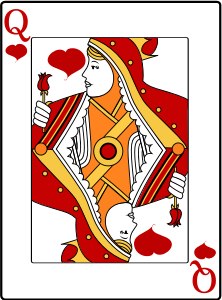The language of the law
The Legal Genealogist is on the road (yes, again) and the schedule for the next week or more is going to be brutal.
 Great fun — first with the Southern California Genealogical Society’s Jamboree and DNA Day, and then with the Institute of Genealogy and Historical Research in Alabama.
Great fun — first with the Southern California Genealogical Society’s Jamboree and DNA Day, and then with the Institute of Genealogy and Historical Research in Alabama.
But demanding of time and attention, for sure.
So guess what isn’t going to be attended to as diligently over that next week or more?
You got it in one.
But as usual I don’t want to leave my faithful readers with a blank space where words are wont to be so…
The terms of the day today are just about polar opposites. Well, I suppose in some cases maybe not so much, when applied to the same person, but…
A queen was (and is) a “woman who possesses the sovereignty and royal power in a country under a monarchical form of government. The wife of a king.”1
She was, according to Blackstone’s Commentaries on the Laws of England, by virtue of her marriage, not subject to many of the disabilities most married women suffered. She didn’t lose her legal identity but instead was
a public person, exempt and distinct from the king, and not like other married women so closely connected as to have lost all separate existence, so long as the marriage continues. For the Queen is of ability to purchase lands, and to convey them, to make leases, to grant copyholds, and to do other acts of ownership, without the concurrence of her lord, which no other married woman can do.2
And, alas, except for those with royal ancestry, it’s a term most of us will come across — if at all — in records of laws imposed on our ancestors.
But there’s another word just above that word in the legal dictionaries we may also come across on occasion. A quean was a “worthless woman; a strumpet.”3 And, yes, the term strumpet is also found in the law dictionaries: “A whore, harlot, or courtesan. This word was anciently used for an addition. It occurs as an addition to the name of a woman in a return made by a jury in the sixth year of Henry V.”4
That one, at least, offers the potential for some fun…
SOURCES
Image: OpenClipArt, user casino.
- Henry Campbell Black, A Dictionary of Law (St. Paul, Minn. : West, 1891), 979, “queen.” ↩
- William Blackstone, Commentaries on the Laws of England, Book the First: Of the Rights of Persons, 9th edition (London: 1793), 208; digital images, Google Books (http://books.google.com : accessed 3 June 2015). ↩
- Ibid., “quean.” ↩
- Ibid., 1128, “strumpet.” ↩



Wasn’t “quean” also a Scottish dialect term for “woman” in general? Pronounced something like “qwaine.” I seem to remember a Masterpiece Theatre presentation back in the day where Alastair Cook had to explain the reference. Don’t remember the title of the miniseries, or the author of the novel it was based on. It was quite dark, about a poor farm woman whose life was full of struggle. I loved it, though! Covering at least two generations, it was a real family saga. Does it require three to be genealogical?